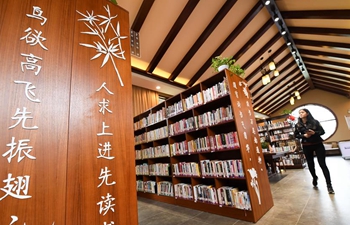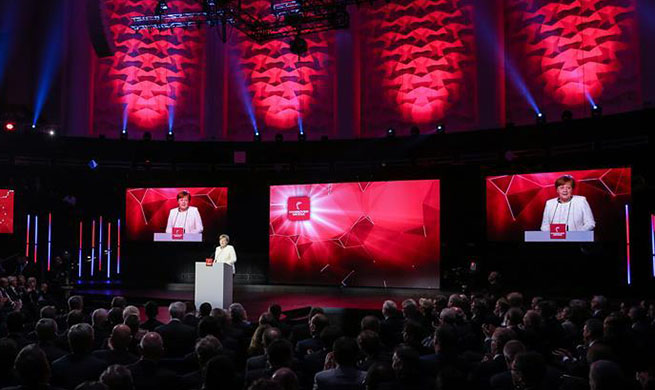SHANGHAI, April 23 (Xinhua) -- Yang Shu is promptly up at seven in the morning, finishes her breakfast and grabs her mobile phone before heading to work. On the 40-minute subway trip, she indulges in the highlight of her day: reading.
The 26-year-old white-collar worker in Shanghai logs into the social network app WeChat, quickly scrolling down vocabulary lists, reads a chapter of the novel "The Magician's Nephew," and then answers questions based on her reading.
As work piles up, Chinese urbanites find little time to read.
Mint Reading, a well-known reading platform that provides content on WeChat, helps users like Yang finish reading English books over 10-minute periods each day.
The platform pushes 1,000-word reading materials each day to users based on their vocabulary, with explanations of words and allusions. After a 100-day reading session, users can finish reading three to four English classics.
"The thick volumes have been divided into fragments, which only take dozens of minutes every day. This suits modern lifestyles and thinking habits," Yang said.
She paid 149 yuan (about 23 U.S. dollars) for one reading session last month and finished reading "The Little Prince."
"I shared my accomplishment as a 'WeChat Moment' the day I finished the book. Although a little shy, I still felt very proud," she said.
According to a recent report by iResearch, a consulting firm, China's mobile reading users reached 340 million last year, an increase of 13.2 percent year on year.
A survey published Wednesday by the Chinese Academy of Press and Publication found a similar trend -- digital reading has been growing in the country, with 73 percent of adults reading online and with mobile gadgets in 2017, up 4.8 percent year on year.
While more and more young people spend time on digital reading, apps and services are deploying more incentives to encourage persistent reading.
On WeChat Reading, another book reading app, the time you spend on reading can be exchanged for "book coins." Five hours can be converted into 10 book coins, which are worth 10 yuan and can be used to buy new digital books.
Mint Reading gives you a free printed version of the book you complete when you finish a 100-day reading session and share your reading schedule on WeChat everyday.
However, reading apps often have strict and rigid rules to stoke a sense of urgency, as most mobile phone users are used to browsing aimlessly, jumping from app to app.
On Mint Reading, if you don't finish your reading tasks within 100 days, you are unable to check any of the reading materials again even if you have paid for them.
Snail Reading by NetEase provides only one-hour free reading time everyday to encourage users to take the time and focus.
While some hate such rules, others regard them as useful incentives to overcome inertia and finish tasks.
Psychologist Ren Li believes that paid-for online reading creates a more concrete goal for users: to finish reading one book. The fragmented, every day task is not very difficult and users enjoy a sense of achievement.
The debate about the value of fragmented reading has been frenetic.
On Zhihu, China's biggest online Q&A community, over one hundred users answered the question, "How do you evaluate reading apps?" It received millions of views.
Some write down their gains, while skeptics criticize fragmented reading, saying it encourages over-simplification and shallow thinking.
"Fragmented reading is an inevitable result of the development of new media and technology. Though not a magical way to enrich people's knowledge, it is certainly not a disaster," said Wang Yanling, a mass media professor with Tianjin Normal University.
Wang believes that, with proper coaching, it could an effective introduction to the classics .
Some users consider it more important to change their mobile phone habits.
"I used to check my phone every day and browse aimlessly. Now, I consciously try to read some articles or books, even just a few paragraphs. It's a meaningful change to me," said Liu Xiaoya, a graduate student in Beijing.



















